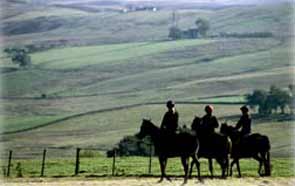A popular horseback safari operator is shipping out of Kenya due to the troubles there. Although the world recession has also played a part in their decision to close the business, Mark and Carla from Siruai Safaris say their failing faith in Kenya is the primary reason. We have seen the decline of the Mara with our own eyes," says Mark. "Our coalition government is utterly ineffective, and while they struggle to maintain law and order, wild life outside of National Parks/ Reserves stands no chance of being correctly protected. With 78 lions poisoned (that we know of) in the group ranches that we ride through there seems little point in offering a safari here."
The latest devastating events are the poisoning of the lions which looks to decimate the population of these proud, wonderful creatures. The problem stems from the cheap availability of highly toxic poison, a tiny amount of which can kill several lions. The method is the lacing of a carcass with the poison which the lions then feed on. The culprits? Some say it's maasai and pastoralists who are simply acting to protect their livelihood. When a lion kills a cow, it's a huge loss. The easiest, and cheapest way to keep the lions away is to poison them. Shocking but true. There is a scheme in place to compensate for cattle losses and negate the need for poisons but the areas where this is a problem are huge and the schemes are just beginning. There were calls to stop the selling of the poison, a bottle of which can be picked up very cheaply in most villages. Even with no new poison being brought in, remaining stocks will last a long time. Read more from:
Wildlife Direct: The Maasai are not poisoning the lions in the Mara TriangleLiving with Lions: Lion poisoning - an urgent issueBBC: Insecticide 'killing Kenya lionsThere are still operators offering horseback safaris in Africa and it remains an amazing experience - to spot wild game from horseback. See here for
Horse Riding Holidays in South Africa, listed on
www.findaridingholiday.com




